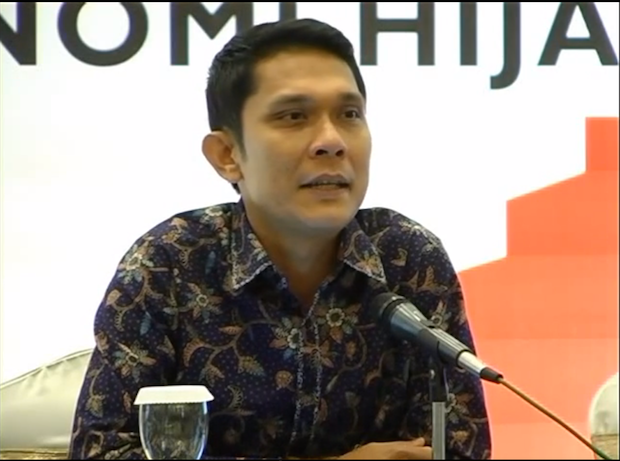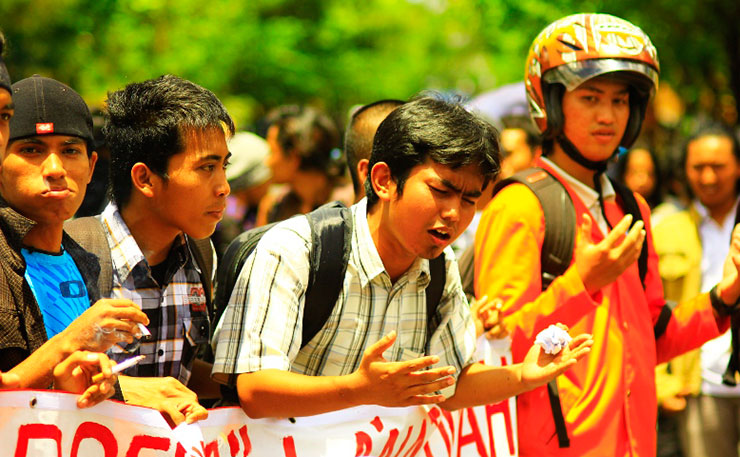Our countries are separated by less than 500 kilometres of sea, and as Indonesians, we have always had a special relationship with our nearest neighbours to the south. Whether it be tourists in Bali, trade and investment, security co-operation, migration or environmental policy, Australia has long been seen as leader in the region.
It’s heavily influential, and that’s why it is deeply concerning to see the Australian government’s recent attacks on environmental groups.
At Friends of the Earth Indonesia, we know what it’s like to face attacks from government and big business for defending the environment: earlier this year one of our activists was killed defending his lands from logging and industrial plantations.
Corruption and destructive resource extraction often go hand in hand, and we as civil society play an important role in upholding human rights and good governance.
Over many years we have worked in collaboration with Friends of the Earth Australia to hold Australian companies to account for their human rights abuses in Indonesia. Just last month we organised a joint research project in the rainforests in Borneo, where BHP Billiton is planing to build one of the world’s biggest and most destructive coal mines.
Now, our colleges in Australia are under threat, and it is my turn speak up for them, because an attack on environmental defenders anywhere is an attack on democracy everywhere.
When governments try to limit dissent they do so in different ways. Firstly, they demonise civil society. Queensland MP and government member, George Christensen’s labelling of environmental non-government organisations as “terrorists” is a clear example of this.
It is not only disrespectful, but also sends a dangerous signal that cracking down on environmentalists across the region is justified in the name of security and development.
Secondly, governments that want a submissive civil society will try to undermine organisations’ financial viability. In Australia this has taken the form of an inquiry into the tax deductibility status of environmental organisations, which had a fresh round of public hearings underway in Melbourne today.
Without tax deductible donations from the public or foundations, it would be very challenging for green groups to raise funds. And that’s exactly the point.
Friends of the Earth Indonesia employs over 100 staff across the country, and I know the importance that secure funding plays in winning big campaigns. Sadly, Australia’s attacks on green groups fit within an accelerating trend, with the Indian government recently taking the drastic measure of freezing the bank accounts of Greenpeace’s sub-continental branch.
Thirdly, governments seeking to silence dissent will act to undermine an independent judiciary and civil society’s access to it. A clear example of this was exhibited when then Prime Minister Tony Abbott labelled a successful legal challenge that halted the Carmichael coal mine in Queensland as “sabotage”.
In Indonesia, we regularly use the courts to challenge the legality of environmental destruction. Sometimes we win, sometimes we lose, but this is an inherent right of any democracy.

It is worrying that the Australian government has recently proposed to change the law in order to restrict environment groups’ ability to challenge government approvals for large developments through the courts.This would set an incredibly bad precedent for access to justice and environmental governance across Asia.
Non-government organisations play an essential role in giving a voice to average citizens, in holding governments and business to account and in driving debate that enriches public policy. Yet, in both Indonesia and Australia, we seem to have a situation in which the business sector is paramount and government is doing its bidding.
Attacking civil society’s ability to advocate, and trying to silence this essential voice, can only undermine the health of our democracies. As the long-fought campaigns against Abbott’s attacks and protests outside the public hearings in Melbourne today show, the vast majority of Australians understand the need for strong nature protections.
The outcome of this inquiry and attack on environmental NGOs will be watched closely by the community in Australia, across the region, and around the world.
Abetnego Tarigan is the Director of Friends of the Earth Indonesia.
Donate To New Matilda
New Matilda is a small, independent media outlet. We survive through reader contributions, and never losing a lawsuit. If you got something from this article, giving something back helps us to continue speaking truth to power. Every little bit counts.




